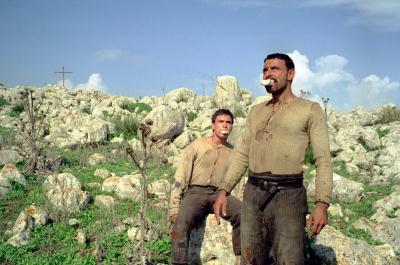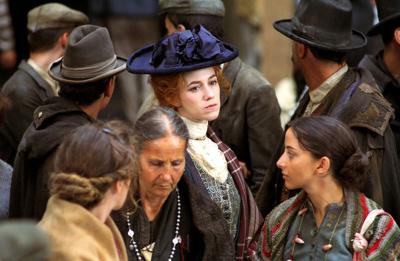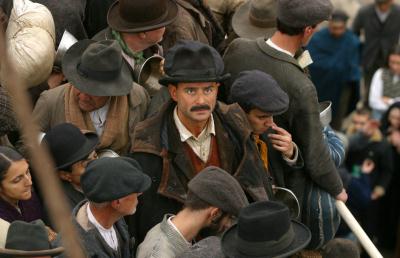The first shot of Emanuele Crialese's remarkable "Golden Door" presents a tantalizing mystery -- two men climbing in barren terrain with stones in their mouths. This is followed by a pullback that loses the men, then finds them again, as with a cosmic eye, on the rocky face of a mountainside. The place is Sicily in the time of Europe's tidal emigration to the New World, and the stones in the mouths are traditions of an ancient culture that the men will leave behind. After countless films in which immigration plays a central role, you'd think the canon was essentially complete. Yet this visionary work adds to it by combining harsh realities with magic-realist fantasies.
That's only the first of a series of captivating and deeply affecting visual and aural images in "Golden Door," which manages to tell an age-old story with terrific verve and imagination. It turns out that the two men -- Salvatore (Vincenzo Amato) and his son Angelo (Francesco Casisa) -- are looking for a sign, any sign, that they should leave and go to America.
Crialese has infused the classical plot of leave-takings and dream-makings with dazzling visual style, dollops of magical realism and profound emotional truth that infuse what we think we know with new energy and resonance. Crialese is one of a handful of filmmakers working today confident enough to let sound and images, rather than static shots of people talking, convey meaning. Much of "Golden Door" transpires in silence, with only whistles or the silvery tinkling of beads on a woman's dress audible on the soundtrack.
All the better for the elegant, dreamlike, utterly indelible images to play across the screen and take hold. Salvatore's mute son Pietro (Filippo Pucillo) takes off his hat to reveal a nest of just-hatched birds in his hair; after seeing novelty postcards from America showing onions as big as boulders and chickens as big as goats, Salvatore imagines seeing his fellow peasants carrying colossal olives across the hills; a crowd stands on a dock, then is cleaved in two as if by supernatural force when a ship pulls away from a dock; intoxicated by myths of abundance and ease, Salvatore imagines himself swimming in a river of milk.
"Golden Door" is a triptych of displacement, beginning with the departure of Salvatore from his native village (Crialese takes his time with that goodbye in yet another silent, emotionally shattering scene), with the ballast of the story taking place in the ship's steerage section, where when Salvatore meets men from other villages, he notes he's "never met foreigners before." Also on board is a mysterious Englishwoman named Lucy (Charlotte Gainsbourg), who like Salvatore is consumed with desire to start over in a place of unbounded possibility.
Gainsbourg possesses one of the great faces of the contemporary screen, her Hapsburg lip and imperious carriage miraculously co-existing with the ineffable air of vulnerability. As Lucy and Salvatore embark on a flirtatious pas de deux on board the ship, Amato almost wordlessly conveys grief, desire and indomitable humanity in a performance as seductive as it is poignant. Both actors skillfully upend old-world emigre cliches, while retaining an archetype's signal virtues of quiet courage and grit.
The third panel of Crialese's luminous, painterly evocation is Ellis Island itself, where the group undergoes the pseudo-scientific intelligence testing and eugenic evaluations that were the practice of the day. The sequences eerily anticipate the enduring anxieties and preoccupations of an American culture balancing nativist paranoia with its own cherished myths of optimism and freedom.
The title of "Golden Door," of course, refers to that portal of possibility to which generations of immigrants have been drawn, and not just in America. This story -- its longing, pain and unresolved tensions -- could be set on the journey from Mogadishu to Aden, Warsaw to Dublin, Ankara to Berlin. It's not just the story of our century, it's the story of our planet, where through the ages great migrations -- pushed by despair and pulled by hope -- reinvent lives and write new futures. "Golden Door" tells the never-ending human story of daring to ask for more, whether what's offered in return is bread or stones.
A wonderfully poetic film offering a fresh perspective on America's early immigrants, "Golden Door" is as affecting as it is innovative.It is in English and Italian with subtitles. It is rated PG-13 and has a running time of one hour, 58 minutes.
Images

Gallery Image


Gallery Image


Gallery Image

Date and Time
Friday Oct 12, 2007 Tuesday Oct 16, 2007
Location
Fees/Admission
Website
Contact Information
315-781-LIVE (5483) or toll-free 866-355-LIVE (5483)


